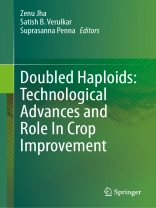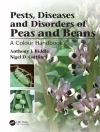This contributed volume covers the technology of double haploid production with special reference to anther culture and double haploid production in crop plants, and applications for basic and applied research in crop improvement.
Globally, plant breeders aim to achieve higher crop productivity by using different breeding techniques. The double haploid genotypes have made this monotonous work easier and more efficient to a greater extent by achieving homozygosity and genetic fixation. Haploids are genotype with a gametophytic chromosome number, and a double haploid is a genotype developed when haploid cells undergo chromosome doubling. Artificial production of double haploids can easily shorten the time required to create homozygous plants which is vital in plant breeding. The book discusses how double haploids can help in accelerating conventional plant breeding programs and make early release of cultivars with superior and desirable traits along with greater utility in other research aspects of plant breeding, genetics, and genetic engineering. It also explains the role of double haploids in complementing back cross breeding by transferring genes of interest from wild relatives thus breaking genetic barriers. The book highlights the role of double haploids in genetic studies like inheritance of quantitative traits, quantitative trait loci (QTL) mapping, Genomics, gene identification, whole genome mapping and production of stable, transgenic plants.
This book is essential for plant breeders, geneticists, researchers, and students in agricultural and crop sciences, offering insights into the transformative potential of double haploid technology in modern plant breeding.
Table of Content
.- Chapter 1: Haploids: Then and now
.- Chapter 2: In vitro culturing haploids
.- Chapter 3: Induction of Maternal haploids
.- Chapter 4: Advancement in haploid techniques
.- Chapter 5: Maize and rice haploids
.- Chapter 6: Success stories.
About the author
Dr. Zenu Jha, a distinguished Ph.D. in Biotechnology, serves as a Professor in the Department of Plant Molecular Biology and Biotechnology at Indira Gandhi Krishi Vishwavidyalaya, Raipur, Chhattisgarh, India. With over 20 years of experience in teaching and research, she specializes in plant tissue culture, focusing on its applications in anther culture, metabolite extraction, and commercial plant production. Dr. Jha’s pioneering work led to the development of a high-yield, disease-resistant double haploid rice line. She has filed two patents and successfully led research projects funded by notable organizations such as the Department of Biotechnology (DBT), the National Horticulture Mission (NHM), the National Biodiversity Mission (NBM), Rashtriya Krishi Vikas Yojana (RKVY), and various State Research Councils. Her scholarly contributions include over 40 research papers and book chapters. Dr. Jha’s achievements have earned her several accolades, including the Young Scientist Award, Pragati Sheel Mahila Samman, and the Best Worker Award from Indira Gandhi Krishi Vishwavidyalaya.
Dr. Satish B. Verulkar, a distinguished Ph.D. in Plant Breeding, is a Professor in the Department of Plant Molecular Biology and Biotechnology at Indira Gandhi Krishi Vishwavidyalaya, Raipur, Chhattisgarh, India. Renowned globally as a leading expert in drought breeding, Dr. Verulkar’s career spans over 32 years, dedicated to both teaching and research. His work has led to the development of nine distinct rice varieties, establishing him as a pioneer in Marker-Assisted Selection (MAS)-based breeding and DNA fingerprinting techniques across crop species. Dr. Verulkar’s research has been supported by prestigious national and international agencies, including the International
Rice Research Institute (IRRI), Stress-Tolerant Rice for Africa and South Asia (STRASA), the Department of Biotechnology (DBT), and the Rockefeller Foundation. He has authored over 80 research papers in esteemed journals and contributed to various book chapters. His achievements have been widely recognized with awards and honors from institutions such as the Rockefeller Foundation (USA), STRASA, IRRI (Philippines), as well as the Outstanding Teacher Award and the Best Worker Award from Indira Gandhi Krishi Vishwavidyalaya, India.
Dr. Suprasanna Penna, Ph.D. in Genetics, is a Professor and Director at the Amity Institute of Nuclear Biotechnology, Amity University, Maharashtra, Mumbai, India. Previously, he served as the Head of the Nuclear Agriculture and Biotechnology Division at Bhabha Atomic Research Centre (BARC), Mumbai. He has also served as an expert consultant for the International Atomic Energy Agency (IAEA) on mutation breeding in crop plants. Dr. Penna has made significant contributions to plant science, particularly in plant biotechnology, mutation breeding, abiotic stress tolerance, and the use of radiation-depolymerized oligochitosan to enhance crop productivity. His research spans salinity-adaptive mechanisms in halophytes and stress tolerance in various crop plants. He has over 400 publications and several edited books on topics such as plant mutation breeding, salinity tolerance, plant genetic diversity, non-coding RNAs, and plant-metal interactions. He serves on the editorial boards of several international journals and has been a Guest Editor for special issues in Frontiers in Plant Science, Physiologia Plantarum, Current Plant Biology, and Physiology and Molecular Biology of Plants. Dr. Penna is a Fellow of the Royal Society of Biology (UK) and the International Society of Environmental Biology.












